Periodontology
This is a branch of dentistry that focuses on the prevention and treatment of the tissues surrounding the teeth. The most common periodontal diseases are gingivitis, periodontitis, gingival recession, and peri-implantitis.



Periodontal diseases are caused by hard and soft dental plaque and the bacteria they contain. Plaque constantly forms and accumulates on teeth, along the gum margin, and in the gingival sulcus. Over time, soft plaque hardens, forming calculus (tartar).
Healthy periodontal tissue is replaced by inflamed tissue. Over a longer period, the gums recede, jawbone begins to deteriorate, periodontal pockets form, and tooth roots become exposed. Plaque and tartar fill these pockets, and the disease process advances into deeper tissues. In advanced stages, teeth become mobile, and the worst outcome is tooth loss.
At SANA Clinic, comprehensive periodontal treatment is performed. Our advanced technology and qualified dentists can prevent periodontal diseases, preserving patients’ beautiful smiles.
Gingivitis
The most common cause of gingivitis is inadequate tooth cleaning. Remaining plaque or tartar causes gum inflammation. Gums become red, swollen, bleed easily, cause discomfort, and may be accompanied by bad breath.
If soft plaque is not removed in time, minerals in saliva cause it to harden, forming supragingival and subgingival calculus.
Treatment:
Professional oral hygiene
- Selection of individual home care tools
- Good daily oral hygiene at home
- Preventive check-ups with a dentist or dental hygienist
Following recommendations at this stage can quickly stop the disease. If the treatment plan is not followed, or professional help is not sought in time, the inflammation progresses to deeper tissues – the condition changes to periodontitis.
Periodontitis
If gingivitis is left untreated, the inflammation spreads deeper, affecting other supporting tissues. Without proper plaque removal, tartar builds up above and below the gums. This irritates the gums, disrupts blood circulation, and destroys the periodontal ligament – the structure that acts as a barrier preventing food and debris from reaching the bone.
As a result, a gap forms between the tooth and gum – a periodontal pocket. Over time, inflammation spreads to the jawbone, which begins to resorb, eventually leading to tooth loss.
Treatment method depends on the stage of the disease. During consultation and examination, the periodontist assesses the condition and develops a treatment plan.
Gingival Recession
When gums recede, the tooth root surface becomes exposed, leading to varying degrees of tooth sensitivity and impaired smile aesthetics. Gum recession is most often caused by mechanical trauma – for example, misaligned teeth, orthodontic treatment, excessive brushing pressure, or using a toothbrush with hard bristles.
Peri-implantitis
A common misconception is that dental implants require no maintenance because they cannot decay. This is a complete myth. The lifespan of an implant, the health of surrounding tissues, and even breath freshness directly depend on oral hygiene.
Patients with implants must attend regular check-ups, undergo professional cleanings, and maintain proper home care. Failure to do so can cause bone loss around the implant, leading to implant mobility and eventual failure – just like with natural teeth.
Frequently Asked Questions
Find answers to the most frequently asked questions about periodontology
What should I do if my gums bleed when brushing my teeth?
Bleeding gums are usually caused by plaque and tartar. Careful removal of these will eliminate inflammation.
The most important thing is regular and proper oral hygiene.
Is periodontal treatment painful?
Like all modern dental procedures, periodontal treatment is not painful. It is performed under local
anesthesia, and every effort is made to ensure maximum patient comfort. The postoperative period is
managed with medication, so discomfort is generally minimal.
When is surgical periodontal treatment necessary?
Surgical treatment is used in cases of advanced periodontal disease, when deep periodontal pockets cannot
be cleaned and treated effectively without surgical intervention.

I treat every patient as a friend, ensuring a warm welcome, expert care, and exceptional service, so they leave with a smile and joy. I complete every treatment only when the best possible outcome is achieved.
Domantas Girskis / Prosthetist Dr. dentist
